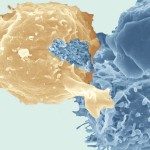Lien vers Pubmed [PMID] – 24831295
PLoS Negl Trop Dis 2014 May;8(5):e2851
BACKGROUND: Kaposi’s sarcoma associated herpesvirus (KSHV/HHV-8) is the causal agent of all forms of Kaposi sarcoma. Molecular epidemiology of the variable K1 region identified five major subtypes exhibiting a clear geographical clustering. The present study is designed to gain new insights into the KSHV epidemiology and genetic diversity in Cameroon.
METHODOLOGY/PRINCIPAL FINDINGS: Bantu and Pygmy populations from remote rural villages were studied. Antibodies directed against latent nuclear antigens (LANA) were detected by indirect immunofluorescence using BC3 cells. Peripheral blood cell DNAs were subjected to a nested PCR amplifying a 737 bp K1 gene fragment. Consensus sequences were phylogenetically analyzed. We studied 2,063 persons (967 females, 1,096 males, mean age 39 years), either Bantus (1,276) or Pygmies (787). The Bantu group was older (42 versus 35 years: P<10(-4)). KSHV anti-LANA seroprevalence was of 37.2% (768/2063), with a significant increase with age (P<10(-4)) but no difference according to sex. Seroprevalence, as well as the anti-LANA antibodies titres, were higher in Bantus (43.2%) than in Pygmies (27.6%) (P<10(-4)), independently of age. We generated 29 K1 sequences, comprising 24 Bantus and five Pygmies. These sequences belonged to A5 (24 cases) or B (five cases) subtypes. They exhibited neither geographical nor ethnic aggregation. A5 strains showed a wide genetic diversity while the B strains were more homogenous and belonged to the B1 subgroup.
CONCLUSION: These data demonstrate high KSHV seroprevalence in the two major populations living in Southern and Eastern Cameroon with presence of mostly genetically diverse A5 but also B K1 subtypes.

